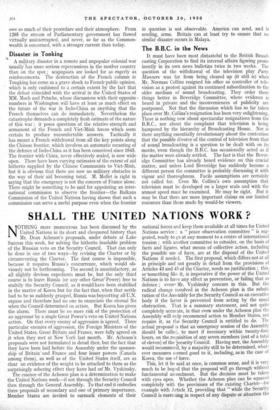Disaster in Tonking
A military disaster in a remote and unpopular colonial war usually has more serious repercussions in the mother country than on the spot ; scapegoats are looked for as eagerly as reinforcements. The destruction- of the French column in Tongking has come as a grave shock to French' public opinion, which is only cushioned to a certain extent by the fact that the defeat coincided with the arrival in the United States of MM. Moch and Petsche, whose discussions with their opposite . numbers in Washington will have at least as much effect on the future of the war in Indo-China as anything that the French themselves can do immediately. Nevertheless the catastrophe demands a completely fresh estimate of the nature of this war ; it poses questions of the relative strength and armament of the French and Viet-Minh forces which seem certain to produce uncomfortable answers. Tactically it has meant a French withdrawal from all the key points along the Chinese frontier, which involves an automatic recasting of the defence of Indo-China as it has been conceived since 1945. The frontier with China, never effectively sealed, is now wide open. There have been varying estimates of the extent of aid hitherto supplied by the Chinese Communists to Viet-Minh, but it is obvious that there are now no military obstacles in the way of their aid becoming total. M. Mollet is right in saying that the emergency is not the concern of France alone. There might be something to be said for appointing an inter- national commission to observe the frontier—the Balkans Commission of the United Nations having shown that such a commission can serve a useful purpose even when the frontier in question is not observable. America can send, and is sending, arms. Britain can at least try to ensure that no similar disaster occurs in Malaya.


















 Previous page
Previous page